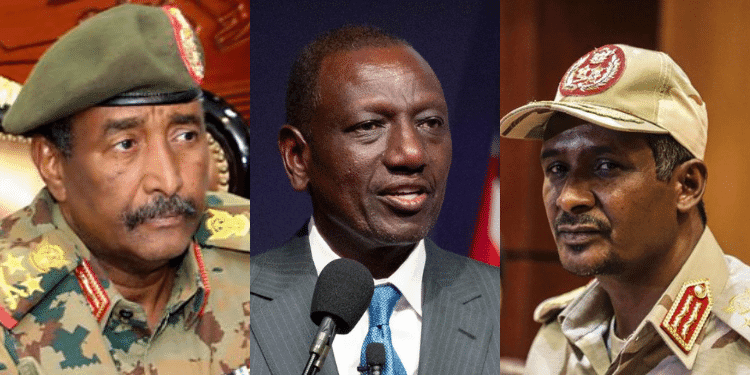Sudan’s transitional government has issued a strong diplomatic warning to African countries engaging with former Prime Minister Abdalla Hamdok’s newly formed civilian coalition, while simultaneously escalating its accusations against Kenya for allegedly supporting paramilitary forces fueling the country’s ongoing conflict.
In two separate but related statements released over the weekend, Sudan’s Ministry of Foreign Affairs made clear that it views external engagement with the “Somoud” coalition—led by Hamdok—as interference in its internal affairs. The ministry warned it would “reassess its foreign relations” with any state backing political actors it claims undermine Sudan’s national sovereignty.
The warning follows a high-profile meeting between Hamdok and South African President Cyril Ramaphosa in Pretoria on June 20. The Somoud coalition, which emerged after the dissolution of the Tagadum group earlier this year, presents itself as a platform for ending the war and initiating a civilian-led political transition. However, Sudanese authorities accuse the group of aligning with external powers and indirectly legitimizing the Rapid Support Forces (RSF), a paramilitary faction battling the national army.
“The Somoud group functions as a political front for foreign agendas, particularly that of the United Arab Emirates,” the foreign ministry said, adding that its members previously signed deals that opened the door to establishing a rival civilian authority in RSF-controlled regions.
Sudan claims the coalition’s actions have fueled divisions, stalled national dialogue, and weakened the legitimacy of the central government. Officials argue that the group’s international engagements could embolden parallel governance structures, threatening the unity of the state.
Renewed Accusations Against Kenya
Alongside the warnings directed at Hamdok’s coalition, Sudan also sharpened its rhetoric against Kenya, accusing Nairobi of serving as a logistical and diplomatic lifeline for the RSF.
Citing recent discoveries in Khartoum state, Sudanese authorities claimed that weapons and ammunition bearing Kenyan army markings were found in RSF supply depots. The government further alleged that Kenya had acted as a channel for Emirati military assistance to RSF forces.
“These are not vague suspicions; they are documented violations that threaten the security of Sudan and the region,” the foreign ministry said.
The accusations came just days after a Kenyan spokesperson publicly criticized the UAE’s alleged involvement in the Sudanese conflict. Sudan responded by saying Kenya’s statement “confirmed a known truth” about foreign interference—but accused Nairobi of failing to account for its own role in the crisis.
Sudan’s government also condemned Kenya for hosting opposition-linked initiatives, including the signing of a transitional charter in Nairobi in March 2025 by the Tasis group, a splinter faction advocating for a civilian government separate from Khartoum.
Officials in Port Sudan rejected any characterization of the RSF’s self-declared “peace government” as legitimate, warning that such narratives only fuel national fragmentation and embolden armed groups.
Regional Tensions Mount
Sudan’s latest statements reflect mounting frustration over what it sees as selective international engagement with non-state actors and rebel factions. Authorities reiterated that the Sudanese Armed Forces (SAF), as the country’s constitutional military body, must be supported in preserving national unity and protecting civilians from what they termed “terrorist militias.”
Drawing parallels with global counter-terrorism campaigns, Sudan’s foreign ministry likened the RSF to extremist groups like ISIS and Boko Haram. “The Janjaweed-origin militia’s actions pose a threat no less severe than internationally recognized terrorist organizations,” it said.
The African Union and other regional bodies have previously called for restraint and condemned efforts to establish rival political authorities in Sudan. Khartoum is now urging these institutions to go further—pressuring member states to disengage from any entities it views as destabilizing.
As the conflict drags on with no immediate resolution in sight, Sudan’s diplomatic tone has grown more forceful, signaling a readiness to isolate regional actors it perceives as undermining its authority.



